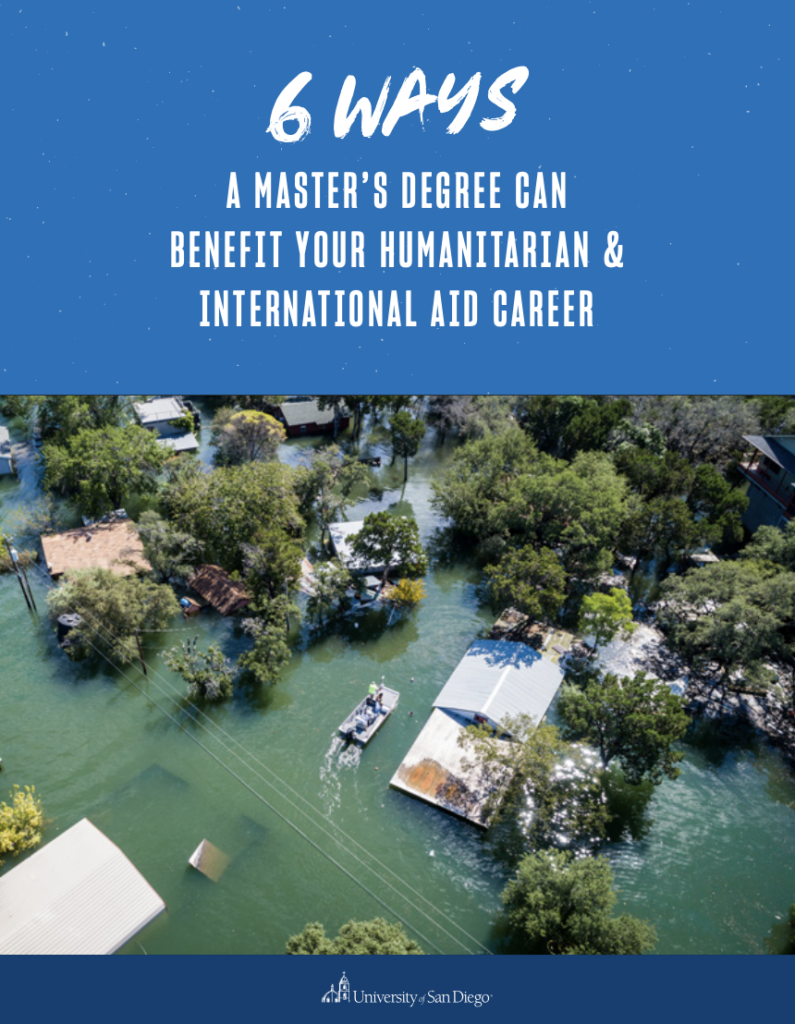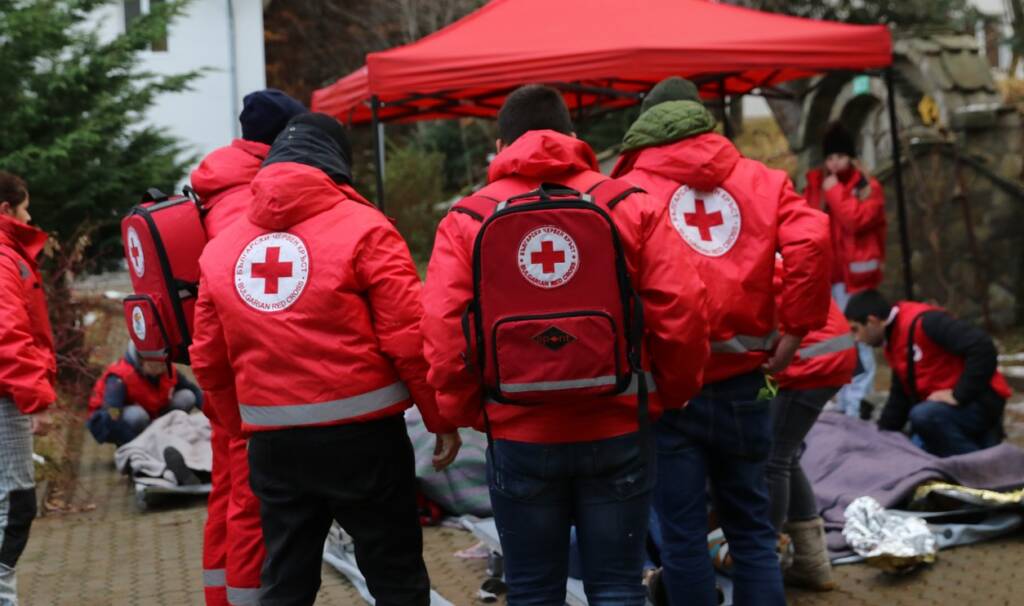The ability to think clearly and rationally in an emergency is a rare trait, but it’s essential in a life-or-death situation. It’s one thing to know what to do if your house catches fire or someone chokes in a restaurant; it’s another thing entirely to help an entire city or state navigate life-threatening events. In large-scale crises such as earthquakes, chemical spills or extreme weather, emergency management professionals are critical to maintaining public health and safety.
Emergency management coordinators provide level-headed leadership, strategic planning and quick thinking during crises, ensuring that those affected receive the necessary information and resources to stay safe and healthy. But how exactly does one become an emergency management coordinator, and what skills do you need? In this career guide, you’ll discover the skills, education and background necessary to become a much-needed emergency management professional.
Emergency Management Coordinator: What You Need to Know About the Role
Emergency management coordination involves organizing and orchestrating various agencies, resources and stakeholders to effectively respond to and recover from disasters or crises. Coordinators work to ensure efficient communication, manage resource allocation and make decisions that minimize harm and maximize the impact of response efforts.
What constitutes an emergency? In the context of this type of work, an emergency is any natural or man-made event that threatens the health and safety of people and property at the local, regional, state or national level. Examples of recent U.S.-based emergencies include the 2023 wildfires in Maui, the 2016 water crisis in Flint, Michigan, Hurricane Katrina in 2005 and the September 11, 2001 attacks on the World Trade Center in New York City. The COVID-19 pandemic resulted in myriad national public health emergencies declared by countries all over the world.
During a state of emergency, coordinators facilitate collaboration and information sharing among public officials, government bodies, aid organizations, first responders and other relevant entities. Their goal is to enhance preparedness, response, recovery and mitigation measures, promoting a unified and effective approach to safeguarding lives, property and communities before, during and after an emergency situation.
Emergency management coordinators are employed by government agencies, law enforcement organizations, health care systems, aid-based nonprofits and private companies. Since the nature of this work is need-based and can be unpredictable, some coordinators are appointed “on the spot” from a different position within their organization. As such, the salary range for an emergency management coordinator in the U.S. varies widely from $33,000 to $113,000.
Is a Career as an Emergency Management Coordinator Right for You?
Emergency management coordination requires an array of practical skills that can apply to any number of crisis situations, from temporary and low-impact to massive and long-lasting. Depending on where they work, coordinators may be called to facilitate communications between a dozen regional emergency response agencies, schedule deliveries of humanitarian aid supplies, manage the installation of hundreds of temporary shelters or draft public safety announcements and mandates.
The most valuable skills an emergency management coordinator can possess include:
- Leadership
- Decision making
- Time management
- Analysis
- Problem solving
- Collaboration
- Organization
- Project management
- Team management
- Excellent verbal and written communication
- Attention to detail
- Ability to stay calm under pressure
More specifically, many government agencies and public safety organizations may require emergency management coordinators to possess other field-specific skills, including:
- Office administration
- First aid
- Emergency preparedness
- Volunteer coordination
- Donations management
- Public safety protocol
- Familiarity with the Incident Command System (ICS)
- Natural disaster safety protocols
- And much more
Most emergency management coordinators hold bachelor’s degrees or relevant certifications, but an increasing number hold master’s degrees in fields such as public health, public administration, humanitarian aid, organizational leadership, criminal justice, public policy, social work or project management. According to a 2023 survey conducted by O*Net, 52% of emergency management coordinator respondents reported that their position required a bachelor’s degree at most, 20% required a master’s degree and 16% required an associate’s degree.
[FREE PDF] Explore 6 Ways a Master’s Degree Can Enhance Your Humanitarian and International Aid Career
Since emergency management is such a specific profession with a wide range of required skills and knowledge, many employers ask that candidates hold at least one professional certification. Popular emergency management certificates include:
- FEMA Professional Development Series (PDS) Certificate
- FEMA Advanced Professional Series (APS) Certificate
- International Association of Emergency Managers (IAEM) Certifications
Becoming an Emergency Management Coordinator
If the dynamic and critical work of an emergency management coordinator appeals to you, it’s important to have the right educational background and experiences that will translate well to the role.
- Earn your bachelor’s degree. A bachelor’s degree is often expected for most professional roles, no matter the industry. Since emergency management takes such a broad skill set and knowledge base, there are few undergraduate degree programs that translate directly to the profession. Studies ranging from public health to criminal justice to environmental science can all provide appropriate foundational knowledge — the important implication is that you completed a four-year degree.
- Earn your master’s degree. If a master’s degree is in your future, you will want to choose a graduate program that focuses more specifically on the knowledge needed to work in emergency management. For example, the online Master of Science in Humanitarian Action at the University of San Diego offers a specialized curriculum that includes courses in disaster management and prevention, human displacement, response logistics and crisis simulation.
- Gain on-the-job experience. There’s no substitute for experiential learning in emergency management; you can’t truly know what it’s like to respond to a public emergency until you’ve done it yourself. Any work that requires making quick, accurate decisions, staying calm under pressure, high-stakes multitasking or managing complex logistics will translate well to emergency management. Experience in military service, paramedicine, law enforcement or public health and safety is highly applicable.
- Earn a certification (or several). In addition to relevant education, agencies that employ emergency management professionals want to see that they possess the necessary credentials to handle large-scale public safety responses. National certifications are offered by agencies such as the Federal Emergency Management Association (FEMA) and the International Association of Emergency Managers (see previous section). However, state governments and other organizations may require emergency response staff to hold more state-specific certifications or complete relevant continuing education.
[RELATED] Uncover 12 Key Humanitarian Aid Certificates and Courses [+ Essential Tips for Selection]
Emergency Management Coordinator Jobs: What Comes Next?
As you chart your career path in emergency management, it helps to know what kinds of organizations have the greatest need. The highest concentration of emergency management coordinators work in federal, state or municipal governments, followed by hospitals and health systems, colleges and universities, humanitarian aid organizations and private companies.
They may also go by different titles, depending on where they work, including emergency management specialist, director of emergency services, emergency preparedness specialist or response coordinator.
While some emergency management professionals work regular weekday hours in an office setting, many need to be on call — emergencies are, after all, unpredictable by nature. Many emergency management coordinators need to be available 24 hours a day, on weekends and holidays. They often work as part of a larger team, so responsibilities may be spread over multiple persons in case one or more are not available.
According to the Bureau of Labor Statistics (BLS), employment in the U.S. emergency services sector is expected to grow at a rate of 3% through 2031. Though this growth rate is slower than average for most professions, it indicates that the field is highly competitive, making candidates with advanced degrees much more desirable.
Of course, there may be employment spikes around emergency events such as wildfires, hurricanes, riots or public health crises. While these events can be devastating, they can also serve to mobilize large numbers of people to help their communities.
Needless to say, emergency management coordinators are essential to maintaining public health and safety, especially in times of crisis. There will always be a need for professionals with the skill set required to conduct and manage large-scale relief efforts, act rationally and effectively when under pressure, facilitate resource acquisition and delivery, enable inter-organizational communication and lead teams in delivering critical services on a tight timeline.
If you feel compelled to explore opportunities in this field, consider expanding your skill set in a practical, holistic program such as the M.S. in Humanitarian Action at USD. Led by faculty with a wealth of on-the-ground experience, this 100%-online master’s program prepares motivated individuals to think strategically about large-scale crises and formulate responses that benefit the greatest number of people possible.
To learn more about this exciting and multidisciplinary degree program, you can request more information here.





